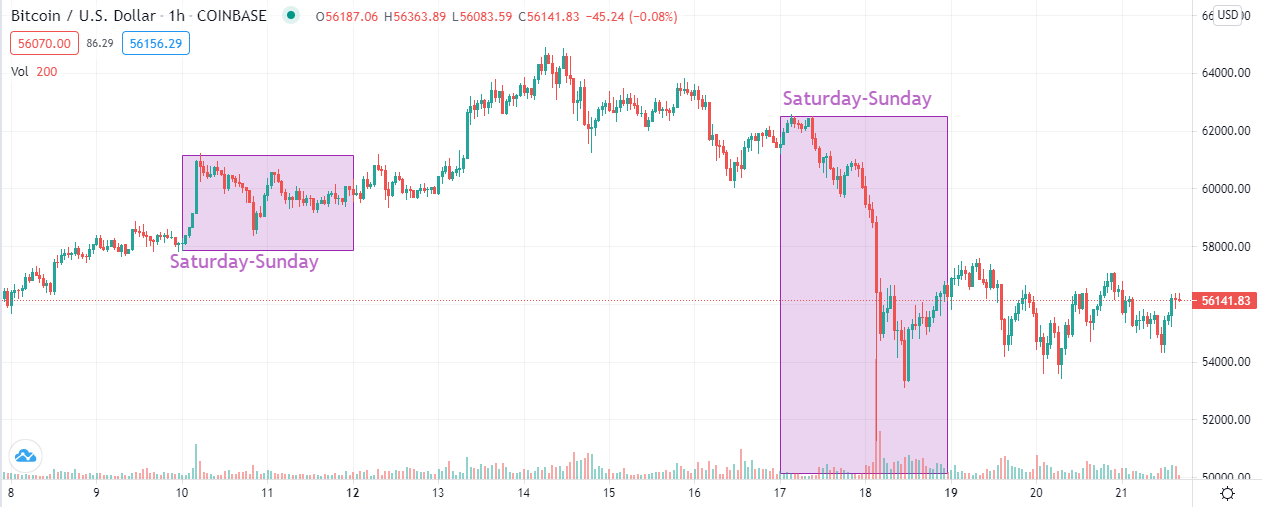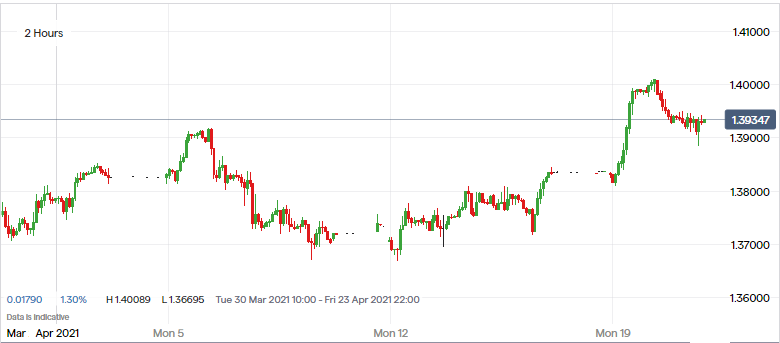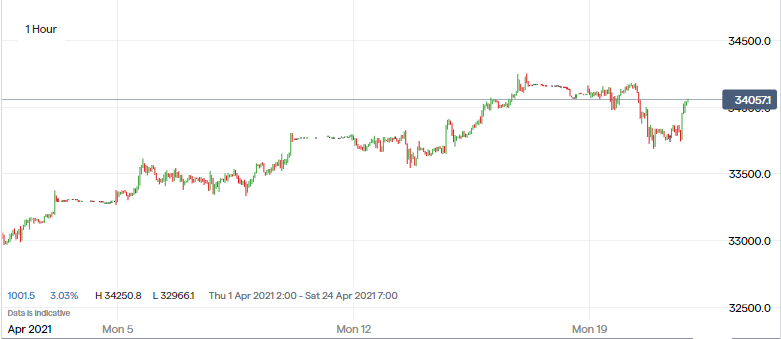Foreign exchange is potentially one of the most attractive markets available to traders, because the market trades non-stop 24/5 from the Monday morning open in Wellington, New Zealand all the way to the New York close on Friday evening.
For some traders, 24/5 trading simply is not enough. LMAX and IG Markets are just two brokers that have been offering weekend trading to clients that feel the need to hedge their positions even when the market is officially closed.
This raises a few questions which my article will answer:
- What are weekend Forex trading conditions like?
- What other instruments are tradable over the weekend?
- Is weekend trading safe?
Cryptocurrency Spill-Over Effects
The origin of retail weekend trading is quite recent and is entirely due to the success of cryptocurrencies. Cryptocurrencies trade non-stop 24/7 across all the various exchanges and many younger traders see this as a great advantage because they can continue to deploy their trading models over the weekend as well.
Bitcoin Price Chart – Weekends Highlighted
In fact, weekends are seen as a crucial time for cryptocurrency traders. An article from CNBC reported various milestones posted on weekends:
- Some of Bitcoin’s steepest price swings have happened over weekends.
- Approximately 60% of weekends since December 2017 have seen a 5% move or higher over a weekend.
- 82% of weekends have seen at least a 3% move by Bitcoin.
The popularity of weekend trading in cryptocurrencies stimulated some brokers into offer weekend trading on Forex and other instruments to their clients. With global markets more and more interconnected, having efficient capital markets is essential and we might see more of a shift towards 24/7 trading in the coming years as “traditional asset classes” catch up to cryptocurrencies.
Another reason why weekend trading might be desirable is the capacity to act following important, unscheduled geopolitical news or developments that would ordinarily cause a gap open on Sunday evening when the Forex market opens.
To sum up: the world is interconnected, and money never sleeps. So, should we not be able to trade on a 24/7 basis?
Forex Trading Hours and the Weekend
Before talking about trading over the weekend, let us just review the official open to close times for various markets. Obviously, different markets have different open market hours.
Stocks and stock indices as well as commodities have their own cash session, which is when the good old “trading pit” used to be open. The cash session is when there is the deepest liquidity and most major players trade during these hours.
For example, open market hours of the New York Stock Exchange and NASDAQ for regular stocks is between 9:30 a.m. and 4 p.m. EST. There are also after-market trading hours (4 p.m. to 8 p.m. Mon-Fri), but there are usually higher trading costs and less favourable execution prices. Similarly, the German Dax cash session is active from 9AM CET to 5:30PM CET Mon-Fri.
Of course, the CME Globex offers electronic trading 24/6 from Sunday at 18:00 EST to Friday at 17:00 EST and so most CFD brokers show continuous price charts for most instruments.
What Time Does the Forex Market Close on Friday?
Forex trading hours are different. The Forex market is something in between the stock market (with clearly defined cash sessions and electronic trading sessions) and the crypto market which trades non-stop 24/7. The Forex market is open 24 hours a day, but only from Sunday at 17.00 EST (the Wellington open) through Friday at 17.00 EST (the New York close). There are 4 defined money centres that cover the 24-hour Forex trading day:
- Wellington: 17:00 EST to 02:00 EST the next day,
- Tokyo: 19:00 EST to 04:00 EST the next day,
- London: 03:00 EST to 12:00 EST,
- New York: 08:00 EST to 17:00 EST.
So concerning Forex trading hours on Friday, the market is effectively closed from 17:00 that day in New York.
Why Trade on Weekends?
The main attractiveness of weekend trading is probably the lack of distractions:
- Day job,
- Family matters,
- Keeping fit,
- Grocery shopping,
- Walking the dog.
The list could go on forever. The bottom line is that retail traders see the weekend as a more peaceful time to conduct their analysis and place trades, because they can follow markets properly.
But how and when can weekend trading be appropriate?
GBPUSD Retail Weekend Chart
Some brokers offer weekend trading on a select group of instruments – usually major indices like Dow Jones, S&P 500, Dax, or major currency pairs like EUR/USD, USD/JPY, and GBP/USD.
So, when does it become useful to have access to indices or Forex pairs on the weekend? When taking into consideration the fact that banks, hedge funds and other large trading partners are not active on the weekend, you need to have a good reason to place a trade.
By observing the GBP/USD chart above, you will likely get the point: while there is some trading going on over the weekend, the range is tiny, with almost zero volatility and hence zero potential for profit.
When you take into consideration the wider spreads that you pay over the weekend, it is logical that it makes less sense to trade the same way on the weekend as you trade during the week.
As such, you might want to consider trading on the weekend if there has been a big geopolitical event (President Biden says something influential; another array of ships becomes stuck in the Suez Canal; a terrible earthquake hits Japan with likely tsunami; a coronavirus mutation gets out of control; etc.).
In this case, there will likely be a gap open at the Wellington open on Monday morning (Sunday evening in most of the world) and getting into the market ahead of the open could prove to be beneficial – if you understand the ramifications of the event. Of course, if you are on the wrong side of the event, having placed that trade could turn out to be a bad decision.
Another way to use weekend liquidity would be to hedge an existing position. For example, if you have a long USD/JPY position going into the weekend, and there is a surge of new coronavirus cases in a G10 economy reported on a Saturday, you may want to sell the Dow Jones Index to hedge your position.
Dow Jones Retail Weekend Chart
Volatility vs Liquidity
Trading on weekends may also sound very attractive to traders who have a regular day job and are unable to trade during the week. However, there are certain pitfalls that you need to be aware of if trading over the weekend:
- higher trading costs,
- lower liquidity.
It is no accident that Bitcoin’s largest moves usually happen over the weekend: there is lower liquidity and as such, less money flowing into the market. In those conditions, it takes much smaller order sizes to “move” the market substantially.
So, on one hand, many active traders look to the weekend as a source of opportunity due to this increased volatility. But on the other hand, for cryptocurrency traders in particular, an extra dose of caution is advised because low liquidity, combined with unregulated trading, no clear circuit breakers or fundamental valuations means that prices can rise or fall further than anyone can expect.
How Do Professional Traders Use the Weekend?
As exciting as weekend trading may sound, the truth is that (for now) professional traders need the weekends to relax and recover. Trading is a very demanding job, and professional Forex traders usually sit down at their desks at 6:30 GMT each morning, put on their headset, turn on their squawk, pull up their twitter feed, turn on charts and do not let up until 7PM GMT.
As such, the weekend is a time to relax and recover, and then to prepare for the coming trading week. How?
- Reading bank sheets and understanding what is being spoken about,
- Checking the economic calendar and highlighting any major events,
- Reviewing key charts and highlighting key levels and plans,
- Reviewing the performance from the past week.
I have yet to meet a professional trader that does not look forward to the weekend. They do not spend the weekend trading Forex.
Final Thoughts
Weekend trading is a novelty introduced by cryptocurrency traders, and traditional asset classes are still in catch-up mode – perhaps because habits are hard to change, and most financial markets are accustomed to the weekend break.
Due to the low liquidity, higher transaction costs and lower range of instruments, weekend trading is currently hard to justify on anything except Bitcoin or other cryptocurrencies. Only if you have an open position that is exposed to a major unscheduled geopolitical event over the weekend, should you consider hedging your position on Saturday or Sunday.
You should have more than enough trading opportunities during the week, independently from the strategy you adopt. If you are having trouble finding time to trade during normal market hours, trading on the weekend is not the right solution. The better solution is to adopt a trading style that works for you.
For example, trading daily candlestick patterns or using a swing trading approach, where you are looking to hold trades for days or weeks. Trading should fit into your day; it should not be your day that should rotate around your trading.
FAQs
Can You Trade Forex Over the Weekend?
The Forex market has official operating hours that go from 17:00 EST on Sunday to 17:00 EST on Friday. As such, the Forex market is closed over the weekend. However, certain brokers do allow weekend forex trading on select major pairs.
Is There Any Trading on Weekends?
The only kind of trading that goes on 24/7 is cryptocurrency trading. So, if you are an experienced trader that knows how to deal with the extra volatility which frequently appears during weekend cryptocurrency trading, take the plunge.
Is it Good to Trade Forex on Sunday?
Normally, trading Forex on a Sunday is not a good idea because there is low liquidity, spreads are wider (so transaction costs are higher) and the volatility is typically very low. However, there are some cases where traders will be very active as soon as the market opens in Wellington: when there has been influential news over the weekend.
In these cases, the Forex market will likely gap on the open, and you can use a strategy like the Forex Gap Trading Strategy to get into a position on a Sunday.



